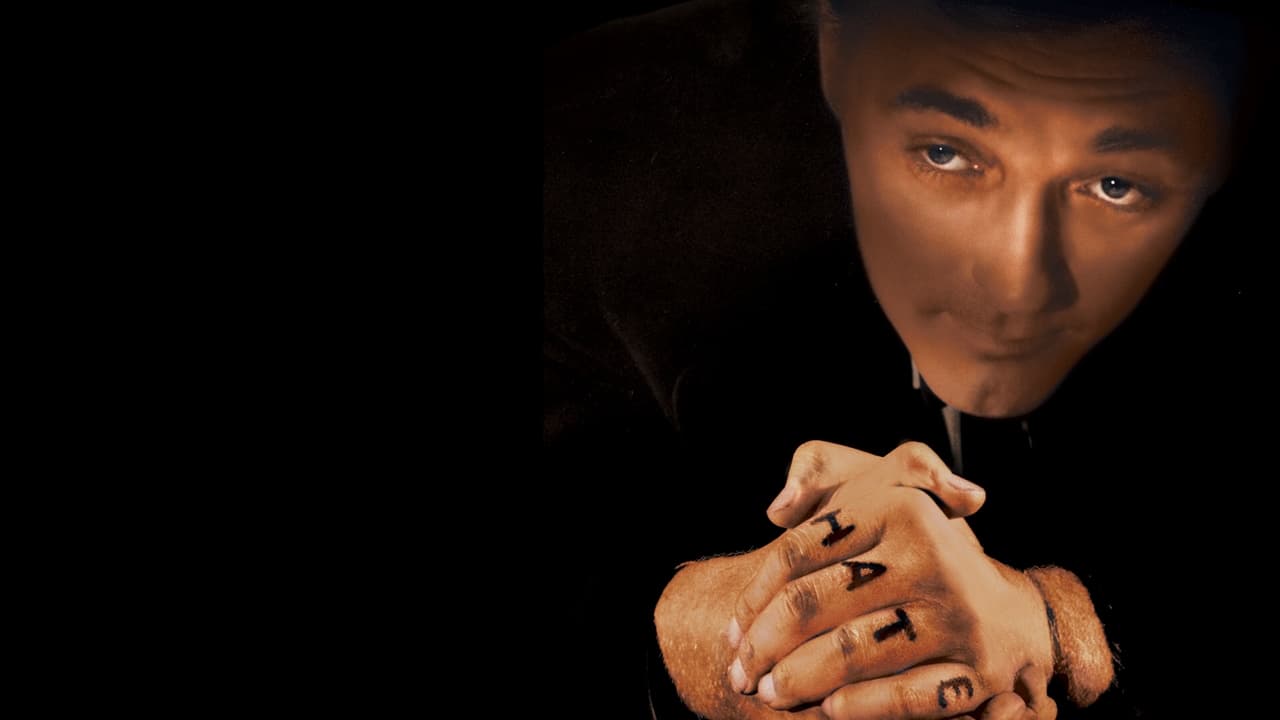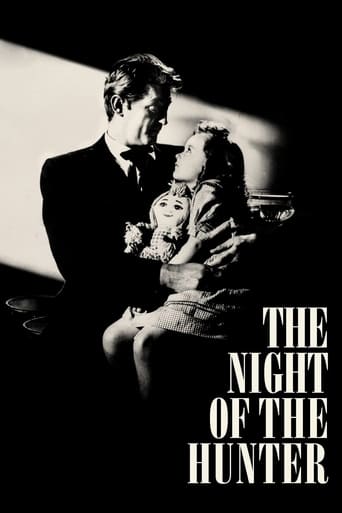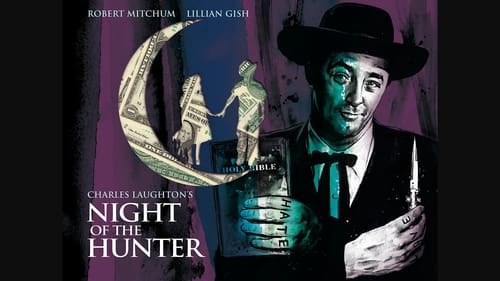



Load of rubbish!!
disgusting, overrated, pointless
Am I Missing Something?
a film so unique, intoxicating and bizarre that it not only demands another viewing, but is also forgivable as a satirical comedy where the jokes eventually take the back seat.
View MoreFirst and foremost, The Night of the Hunter contains the extremely famous "love and hate" clip that you've probably seen in a montage or reenacted in another movie. Robert Mitchum, normally remembered for his blasé, laid-back performances, gives a fantastically energetic performance-one that was famously snubbed by the Academy in the 1955 Oscar nominations. In 1955, countless heartbreaking performances were beaten out by Ernest Borgnine in Marty, including Robert Mitchum's two finest hours: The Night of the Hunter and Not as a Stranger. In this classic thriller, Peter Graves starts the movie by leaving a lasting impression with his two young children, Billy Chapin and Sally Jane Bruce. He's robbed a bank and killed two people, but before he's arrested, he hides the stolen money in Sally's cloth doll. Robert Mitchum meets Peter in jail and learns about the stolen money. Then, Preacher Mitchum charms his way into Peter's family, hoping to find the hidden money. His pious religious front fools everyone, including Peter's widow Shelley Winters, but there's a very dark side hidden underneath. . .I could write pages about Bob's incredible performance, but instead I'll just wholeheartedly recommend you watch the movie for yourself. He's strong yet desperate, gentle yet frightening, seductive yet cold, and one of the most memorable villains in classic history. Shelley Winters is very convincing as the weak, meek widow, and evokes an enormous amount of sympathy from the audience. Billy Chapin is very engaging, and no doubt would have been cast as Jem in To Kill a Mockingbird if he were the right age. Lillian Gish rounds out the cast, playing a tough, protective, intelligent hero. It's great fun to watch her armed with a shotgun battling against the burly Bob!Not everyone is Clint Eastwood, and back in the day, it was pretty unusual for actors to cross over and direct a feature. Charles Laughton directed this noir classic and shows remarkable talent behind the camera. He doesn't just point and shoot; he's sensitive and highlights nuances, he draws remarkable performances from his actors, and is deliberate in his movements. There's so much to appreciate about The Night of the Hunter, and I suggest you rent it-I own a copy-and watch it on a dark, spooky evening.
View MoreCharles Laughton, better known as an actor, only ever directed one film in his life. That being The Night of the Hunter, where a small town husband commits a bank robbery, in the process killing two people. He gets caught, but before that he assists his children in hiding the money and swears them to secrecy. In the prison, awaiting hanging, he accidentally reveals to a corrupt preacher the fact that the kids are in the know. The man gets hanged, but the preacher is released, and he promptly sets out to woo the widow and squeeze the hiding place of the money from the children.Laughton was heavily influenced by the German expressionism style of film making and it shows. Heavy shadows, sharp silhouettes, Gothic imagery and stylized dialogue are the order of the day. The film even opens with the detached head of an old woman floating in space, quoting Bible to a bunch of children. Or rather their heads, also floating in space.And I have to be frank, it's more corny than impressive. You get the idea that Laughton likes this art style, but is not fully able to pull it off. The film is filled with artistic touches, but most of them cause the story to flow erratically. Granted, there are also some truly beautiful shots, especially when Laughton plays with silhouettes, but I was still pulled out of the story way too often.Full props to Robert Mitchum as the preacher Harry Powell. He has one of the best voices I've ever heard in cinema, and even though the character he plays is one of the more over the top men of cloth I've ever seen, he almost manages to pull it off, which is a small miracle in and on itself.All in all the film definitely has an identity. Personally I didn't much care for it, but I can see why some people hail this as a masterpiece. It dances just at that razor edge where it could be seen as something unique and daring, rather than presumptuous.
View MoreIn the theater "expository" is when the actor talks to the audience. It is sometimes necessary to further the play, but is generally thought to be a weakness of writing. In the case of film, it should be absolutely unnecessary. As a visual medium, any expository should be easily handled by the visuals. When it is used, it is a sure sign that the screenwriter (and by extension, the director) just couldn't find a way to express it any other way except having the actors talk to (or at) the audience.In the case of "It's a Wonderful Life" the Angels talk to the audience and it works, moving the story forward. In "The Night of the Hunter" it fails miserably. The morality tale should be carried by the story, not by bible verses directed to the audience.Another form of expository is when the camera is used to show the passage of time or distance, usually through montage. Hitchcock was a master of the visual montage. His technique is crisp and sharp. Other masters of the visual montage are Orson Welles, John Ford, Wes Anderson, and Steven Spielberg. Unfortunately Laughton's visual montages were slow and plodding, using animals in the foreground of the scene to show the passage of distance. It was a good thought, but it didn't work.Laughton was troubled that his first directorial attempt was a box office and critical failure, and he never directed again. That is a shame, because in spite of these weaknesses, most first time directors have failings and they get better over time. Laughton clearly had directorial chops. He just needed more experience.There are many directorial "one-hit-wonders." First attempts are great, and everything after that fails. There have many many actors who turned director. Some failed, and some succeeded.Laughton showed so much potential as a director. There was so much to be proud of, that he could have overcome the weaknesses in later films, chalking it up to a learning experience.The camera work was, at times, exquisite. When the actors were not lined up across the screen (a directorial weakness), he moved them in and out of the foreground and frame (a strength) with the grace of a veteran. The lighting was masterful. Transition between night and day, and the use of light and shadow showed that Laughton had skill.The story that the script is based on is one of the films great strengths, but one of the great weaknesses was the script. Stilted and unnatural dialogue held the cast and director back. The expository, that I mentioned earlier, is something that is used with great effectiveness in a novel, where expository is how things get explained, talking in the third person directly to the reader. James Agee, the script writer, was a novelist. This explains why expository happened. Clearly they should have put the script in the hands of a seasoned screen writer, so the director and actors would have had better substance to work with.Now, let's really get positive. The characters in the story were strong, and the casting backed that up with strong, exceptional performances. Clearly Laughton could have been regarded as an actor's director. He knew what the actors needed from him. As an actor, he possessed natural skill, and was backed by directorial masters. He learned these lessons well, and directed his actors with the skill of a veteran.Mitchum, Winters, and particularly Gish turned in performances that absolutely saved the film and turned it into a film well worth watching. When the script didn't get in the way, the supporting cast was also very good.I am not a big fan of Robert Mitchum, but when he plays evil, it is truly evil. Between this performance and "Cape Fear" I could say that Mitchum (along with perhaps Lon Chaney and Lee Marvin) may be one of the most evil actors ever.Two time Oscar winner, Shelley Winters plays the weak and vulnerable mother. She is emotionally and (sometimes) physically beat down. You can see her try to maintain dignity when she is told she is unworthy. The conflict in her weighs heavily. She tries to hold her head high, but just cannot keep it up for very long. Winters masterfully delivers. She may be the most sympathetic character in the film.Lillian Gish. Ah, Miss Lillian. La Gish. Maybe the greatest actress we have ever had. From the time she comes on the screen, she dominates and the whole tone changes. Even Mitchum cannot keep up with her-it becomes her film. She has a strength and a softness that she brings to every role. If you ever get a chance to see "Broken Blossoms," "Orphans of the Storm," "Way Down East," or "The Wind" take the time.Film acting is, in all cases, in the eyes. It is the eyes that project what is going on in the soul and the mind of the character. Gish is a master of using her eyes to convey what is inside. (There are a very few actors that effectively do this.) If Gish never smiled, never frowned or grimaced, never used her body to convey anything, it would be fine. She acts from her eyes. Her smiles and grimaces are delivered by her eyes. When she looks at someone, she really sees them. She looks inside them. There is an understanding that is conveyed by the way she sees. There is really no acting involved...she is being.This is really a film worth seeing. You should let go of the weaknesses, and focus in on the strengths. In spite of everything, you will not be disappointed. I gave it a 9 out of 10.
View MoreThe Night of the Hunter is directed by Charles Laughton, his first and unfortunately sole film that he directed. The film is written by James Agee adapted from Davis Grubbs novel. It sees a fanatical murderous preacher Harry Powell (expertly played by Robert Mitchum), marry the widow of his former cellmate Ben Harper(Peter Graves), in an attempt to find the location of $10,000 that Harper had stolen in a robbery, prior to his arrest.This is one of the best films I've ever seen, and one of my all-time favourites, which is a phase I don't use lightly. The direction is near faultless. Despite many of the off-screen issues surrounding this film, It's amazing how well it congealed together. The framing and stylish noir set design gives this film an incredibly eerie atmosphere, which in turn adds a dreamlike sense of impending dread throughout the entire run-time. This is felt most notably in the scenes where the terrifying Harry Powell is hunting Harper's two children Ben(Billy Chapin) and Pearl(Sally Jane Bruce).Shelly Winters plays Willa Harper. After her husband dies in prison at the hands of Powell. She Is seduced, and taken in by Powell, and soon finds herself helpless, as the lingering omnipotent stature of Powell looms large over her and her children. Winters gives a terrific performance of someone that is both smitten and trapped at the same time.The standout of the film without a doubt is Robert Mitchum as the Preacher Harry Powell. Mitchum delivers one of the finest performances in cinematic history. He's able to effortlessly switch between being charming and charismatic to frightening and hateful on the turn of a dime. His performance is utterly compelling and as his character permeates through every scene of the film. His performance is matched pound for pound by Lillian Gish as Rachel Cooper. Gish plays a steadfast woman, who takes the children in when they are trying to evade Powell. She does a great job of being a warm and unshakeable saviour figure for the children, against Powell's menacing and unrelenting wrath.It's truly a shame that Laughton never got the chance to direct another film. The Night of the Hunter was so far ahead of it's time. There are moments in the film where the subject matter and imagery are still shocking and unrelenting even for today's audience. The film does have a couple of missteps. The child actors do tend to overact in some places, but it's not enough for it too become distracting. There are also a couple of pacing issues in the middle act which is quickly smoothed out when the film enters into the final act.The Night of the Hunter is a film beyond it's years, and still holds up as-well if not more-so today. It's an un-compromising thriller wrapped inside a noir, wrapped inside a Grimm fairy-tale, and it's a masterpiece.
View More